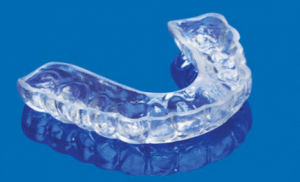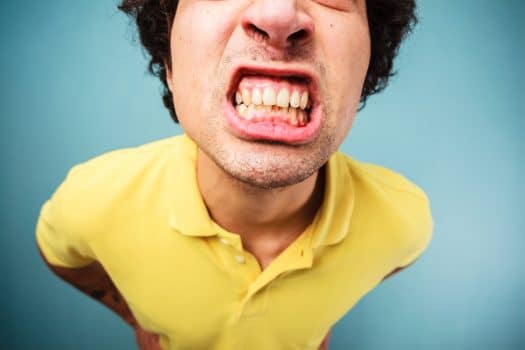You probably see lots of commercials about toothpastes and mouthwashes that claim to prevent enamel erosion that foods and beverages cause. But perhaps an even more significant cause of enamel erosion is bruxism, which affects somewhere between 10% and 30% of the population.
What Causes Bruxism?
Bruxism is a condition where you grind or clench your teeth. Most people with bruxism either grind/clench unconsciously during the day, or while they sleep. Bruxism is typically either a response to stress or anxiety, or indicative of something wrong with your bite or tooth alignment.
What are the Dangers of Bruxism?
Most people experience occasional bruxism. If the behavior is infrequent and/or mild, then often treatment will not be necessary. However, if it persists, you need to seek advice from your dentist or orthodontist, as the condition could become serious and pose a real threat to your healthy smile.
Persistent grinding/clenching over time could cause teeth to break, become loose or shift their alignment. That means that if you’re wearing braces—or wore braces—you want to address your bruxism before it undoes some of the hard work your braces performed. People who clench or grind their teeth during sleep are more likely to have other sleep disorders, such as snoring and sleep apnea.
Chronic bruxism is often a catalyst for other dental inconveniences, such as needing root canals, crowns, or even tooth extractions. Not only can severe grinding damage teeth and result in tooth loss, it can also affect your jaws, and can cause or worsen the painful conditions of TMD/TMJ.
TMJ stands for the temporomandibular joint, which connects your skull and your jawbone. Not all TMJ disorders are caused by bruxism, but it is the leading culprit. Symptoms include:
- An aching face or jaw line
- Soreness in or near the ear
- Tenderness of the jaw
- Locking of the joint, preventing the opening or closing of the mouth
- Pain while chewing
- Clicking or grating when the mouth is opened
Bruxism can even change the appearance of your face by bulking up the muscles (think of the workout they are getting if you’re grinding eight hours a night). The masseter, the cheek muscle that helps us chew, is one of the strongest muscles in the entire body. Dental researchers say it can exert up to 600 pounds of force per square inch.
How Do I Know if I Grind My Teeth?
According to the Mayo Clinic, signs and symptoms of bruxism include:
- Teeth grinding or clenching, which may be loud enough to awaken your sleep partner
- Teeth that are flattened, fractured, chipped or loose
- Worn tooth enamel, exposing deeper layers of your tooth
- Increased tooth sensitivity
- Jaw or face pain or soreness
- Tired or tight jaw muscles
- Pain that feels like an earache, though it’s actually not a problem with your ear
- Dull headache originating in the temples
- Damage from chewing on the inside of your cheek
- Indentations on your tongue
- Your mouth won’t open or close completely
If you suspect you may be grinding your teeth, visit a dental professional. He can examine your mouth and jaw for signs of bruxism.
Treatments for Bruxism
There are several ways you might be able to stop your bruxism without needing a dental appliance or procedure, though most require some self-discipline.
- Reduce or remove caffeinated foods and beverages from your diet
- Do not drink alcohol, as grinding tends to intensify after alcohol consumption
- Do not chew gum, as it will only further aggravate those muscles
- Relax the jaw by applying warm, moist heat
Braces
Visiting your orthodontist, especially if you have a malocclusion, can be a step in the right direction to helping with serious bruxism. A proper bite alignment usually translates to fewer jaw issues. By straightening teeth and correctly aligning the bite (and jaw structures) there is evidence (as this
By straightening teeth and correctly aligning the bite (and jaw structures) there is evidence (as this archwired thread shows) it can help to stop bruxism from happening.
It is a possibility that it might not help (as there can be numerous other reasons that cause the bruxism) but it is worth discussing with your orthodontist.
Night Guard
 If these tips don’t work, you might need to wear a night guard to prevent your clenching from damaging your teeth. Night guards are available over-the-counter, but your dentist or orthodontist can custom fit you for one that fits perfectly over your teeth. A professional also can help you decide whether to place the guard over the top teeth, bottom teeth or just the front teeth.
If these tips don’t work, you might need to wear a night guard to prevent your clenching from damaging your teeth. Night guards are available over-the-counter, but your dentist or orthodontist can custom fit you for one that fits perfectly over your teeth. A professional also can help you decide whether to place the guard over the top teeth, bottom teeth or just the front teeth.
And if you are worried about what happens if you have braces, you don’t need to. Once your teeth start to shift, your orthodontist will create a new night guard to fit your improving smile.
Wearing a night guard will protect your teeth from damage, but if the behavior persists your dentist or orthodontist may refer to a medical doctor to try to treat the underlying stress or anxiety that is provoking the condition.
At Orthodontic Associates, we don’t just specialize in making perfect smiles. Our amazing staff at each of our nine convenient Baltimore-area locations takes the time to examine the overall dental health of each patient, and make recommendations and perform treatments if necessary. We look forward to making you smile.



